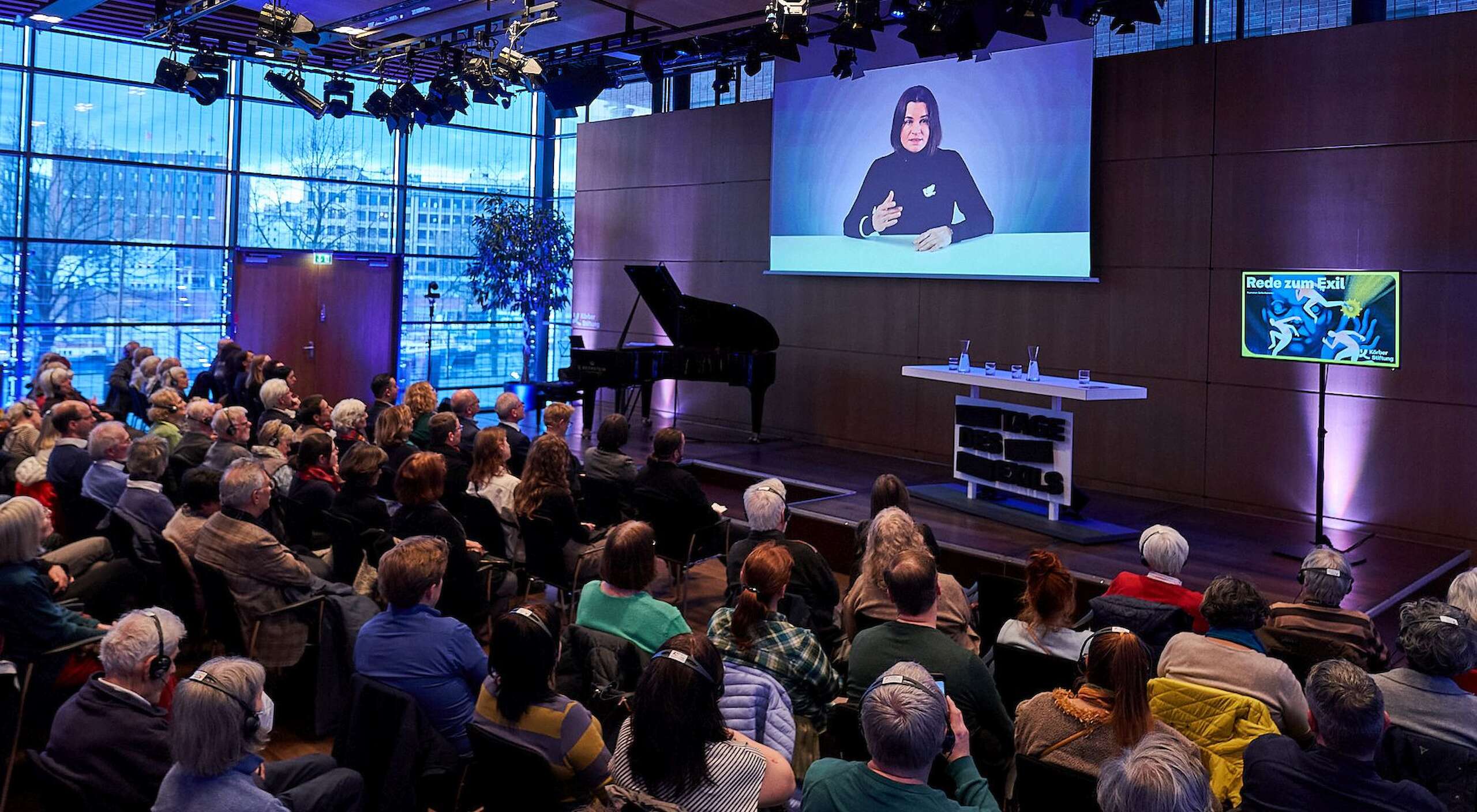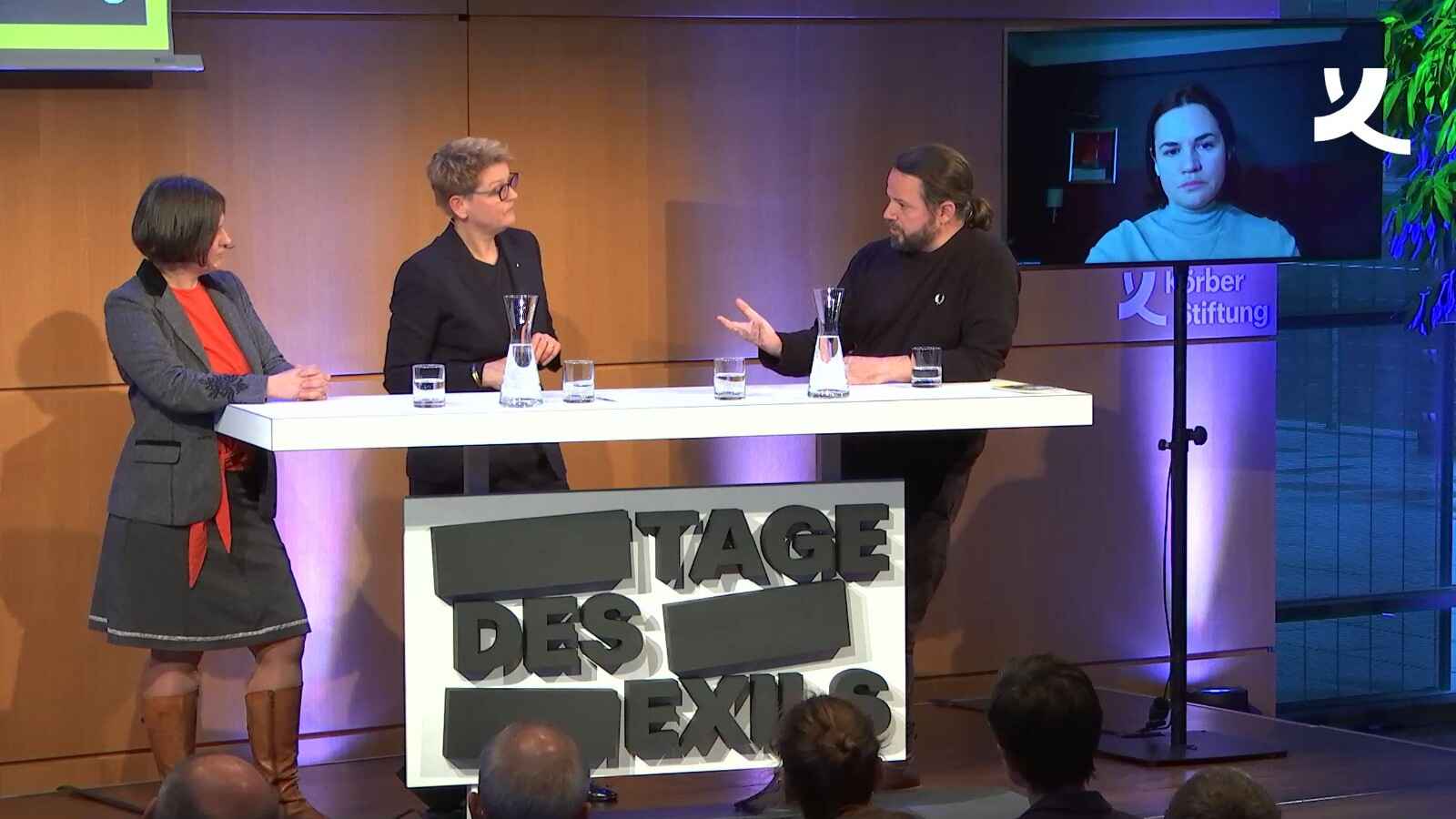
Foto: Claudia Höhne
Rede zum Exil der Schirmherrin Swetlana Tichanowskaja
Schirmherrin Swetlana Tichanowskaja hielt zum Auftakt der Tage des Exils Hamburg am 11. April 2023 im Körber Forum die Rede zum Exil
Patron Svetlana Tsikhanouskaya gave the speech on exile at the opening of the Days of Exile Hamburg at the Körber Forum on 11 April 2023
Dear friends,
I am honored to be the patron for this year’s Days of Exile and I want to thank the Körber Foundation for inviting me to give the Speech on Exile at this important event. I would like to use this chance to share my own personal story of exile with you today.
Exile as a story of shattered families
Indeed, I am just one of the hundreds of thousands of Belarusians who were forced to leave the country since the stolen elections of 2020.
People were fleeing repressions, torture, humiliation. People were fleeing lawlessness and violence. Many were trying to stay as long as possible untilone day the KGB knocked on their doors. None of us wanted to flee the country we love and cherish so much.
As exiles, we carry a profound love for the country we left behind, for our culture, and our national identity. In many ways, this love intensifies when you are far from home, and it is this love that fuels our determination to keep our culture alive, even as the dictator back home tries to destroy it.
Exile is a complex and emotional journey, extending beyond the physical act of leaving one’s home. It entails being torn from one’s community and purpose, and being unable to return to the place where one’s heart and soul truly belong.
For many of us, exile is a story of shattered families, a tale of loved ones separated and lives upended. Exile, by its very nature, is imposed upon us, but the choice we make in response defines our character and our resilience.
The stolen elections of 2020
My story began in 2020, when the dictator launched his brutal attack on Belarusian democracy by arresting activists and politicians, including my husband, Siarhei Tsikhanouski. He had just announced his intention to run for the presidency when he was detained.
Feeling compelled to act in the face of this injustice, I decided to submit my candidacy instead of him. I made this choice out of love for my husband and our country. The regime registered me as a candidate merely to humiliate meand make me a laughing stock, believing I wasn’t a serious contender. However, the joke ended up being on them.
On August 9th 2020, Lukashenka lost the elections, but he went ahead and proclaimed himself president. Dozens of thousands, who protested against this blatant electoral fraud, were detained, beaten, tortured and even raped injails. Ten people were killed by KGB and police.
After the stolen elections, I was forced to leave Belarus. Together with my children, I found refuge in Lithuania, but my husband is still a political prisoner in Belarus. Recently, he was sentenced to 1,5 years more, in addition to his 18 year sentence. He is held in solitary confinement, and my children have not seen him since he was imprisoned. State propaganda spreads the rumour that he is dead.
But let me tell you – Siarhei is unbroken. He knows that he is right, that he should not be in prison. And he found an incredible strength inside himself.
Together with him, there are more than 1,500 political prisoners. They are subjected to physical violence and psychological torture every day. They are denied basic human rights and contact with others. They receive no letters, no parcels, food or money transfers. Special tags are used to mark political prisoners, so the jailers know whom to torture more diligently.
Every day, there are 17 new political arrests on average, and the regime’s puppet courts are working like a factory, mass-producing political sentences without any justice.
One wonders how they would have time to catch any real criminals when theyare so busy chasing down opponents of the regime. But that is a sad truth: thejustice system was repurposed into a machine of repression.
Exile as Opportunity
My own story continued in Lithuania, where I established my office and the United Transitional Cabinet to lead Belarus to democracy, to defend our independence and to free all political prisoners. This is the goal I am fighting for. Being in exile, being in freedom, gives me a chance to raise the voice forall the Belarusians who were silenced by the regime.
If I was in Belarus now, I would be in prison like my husband, like Maria Kalesnikawa, who campaigned together with me, like the young student Danuta, who was sentenced to 6,5 years for sharing an anti-war message.
Like our Nobel Peace Prize winner Ales Bialiatski, a lifelong defender of human rights, who was sentenced to 10 years in prison recently.
If there was any doubt about what would happen to me if I returned to Belarus, it was removed this month when the regime’s fake court sentenced me to 15 years of prison in absentia.
Of course, this entire trial is a farce, with the regime’s puppets playing the roles of judge, prosecutor, and even defense. I was denied any information about my own case.
These show trials are a tool of intimidation, just like the regime’s threats to renounce citizenship for Belarusians in exile and to seize the property that you may have in Belarus. When they can’t get to you, they use whatever points of pressure that they can find, even harassing your family.
The Belarusian diaspora
This fake sentence doesn’t change anything for me – but returning to Belarus is not an option at this point in time. My life with my children, for now, is in Lithuania.
My new home, Vilnius, is no more than 25 kilometers from the Belarus border. However, a vast divide exists between this city of freedom and the ongoing repression and Russian occupation in my country.
Historically, a strong bond links the people of Belarus with Lithuanians as wellas Poles and Ukrainians. At the beginning of this year, we celebrated the160th anniversary of the January Uprising of 1863 which united us against Russian imperialism.
From the very beginning, the governments of Lithuania and Poland have supported our democratic movement for Belarus and have helped Belarusians fleeing repression to settle in their countries. In Lithuania, we have dozens ofthousands of Belarusians – in Poland, more than 100,000.
Not only individuals but also businesses, startup hubs, and even universities have resettled, as repressions in Belarus have intensified.
It has created a vibrant, dynamic community of Belarusians in exile. They are supporting Belarus and Ukraine, many are studying or even starting their owncompanies. I know that many will return to Belarus after democratic changes and help develop our country.
I always say: When you support Belarusians in exile, you are also investing inthe future of the nation.
I have to admit that a life in exile is also a life in transit. Because we all know that we want to go back to our country. I am forever thankful for the hospitality that Lithuania has offered me and my family, but I know that my future is in Belarus, with my husband.
This is our goal, this is what we fight for every day – to be able to return to a free, democratic Belarus and to protect the sovereignty of our country. At the moment, a return for us is not possible.
As a Belarusian in exile escaping the regime’s repression, you can risk being left without valid papers. That’s why we are working closely with the governments of friendly countries to make sure that Belarusians can receive the legal documents they need to travel.
It may sound like a small matter, but my task is to listen to the needs of all Belarusians, including those in exile. In the last few years, I had thousands of conversations to understand what we can do to help.
I am very proud of Belarusians in exile. Just recently, on March 25, we celebrated our Freedom Day as the Day of Solidarity with Belarus, and we called Belarusians all over the world to make activities in support of freedom and democracy.
Every time I travel, I try to meet with the local Belarusian diaspora to learn about their situation, their challenges and hopes. It gives me strength and courage to go on.
On the one hand, I am myself a political refugee, a mother with two children,and my husband is held as a political prisoner in my home country. In this situation, I feel a strong connection not only with Belarusians who fled the regime’s terror, but also with all those exiled from other countries because of political repression.
On the other hand, as a political leader, I have a special responsibility to my people, both inside Belarus and outside, to work for positive change. I spend most of my time traveling to represent democratic Belarus and make sure that the interests of our people are on the international agenda.
Bridges of understanding
Today, as millions are moving across Europe to escape war, terror, and tyranny, it is more important than ever to build bridges and to open our hearts as well as our homes to those in need. I am happy to see that thecircumstances, terrible as they are, also bring out the best in people.
They bring out the best in those Germans and other Europeans who are offering shelter, humanitarian aid, or helping in other ways to lessen the suffering of Ukrainians. They bring out the best in all those Poles, Lithuanians, and other Europeans who have helped Belarusians build a new existence in safety from the regime’s terror.
We are all looking forward to a free and democratic Belarus, and I know thatmany will return to help rebuild their country and undo the damage that wasdone in the years of dictatorship. They will bring new skills, new ideas, andnew friendships from their time in exile.
But I want to stress that people in exile should not be seen as victims. I havebeen fortunate to be able to meet with exiled Belarusians in many countriesand I am always amazed by their energy, passion, and commitment to buildinga successful life and helping their home country.
I hope that Days of Exile will contribute to building new bridges ofunderstanding and new connections. These meetings are the best way to afuture of peace and dignity for all humanity.
Let us remember that exile is not just a personal experience, but it is also aglobal one. It is a reminder of the importance of human rights, and the need tostand in solidarity with those who are oppressed. We must bring about a worldwhere no one must flee their home in fear for their life and freedom.
In this spirit, I send my best wishes for this year’s Days of Exile and I thankyou once again for opening your hearts to Belarusians.
Thank you.
